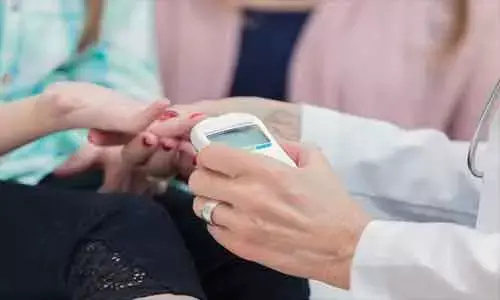- Home
- Medical news & Guidelines
- Anesthesiology
- Cardiology and CTVS
- Critical Care
- Dentistry
- Dermatology
- Diabetes and Endocrinology
- ENT
- Gastroenterology
- Medicine
- Nephrology
- Neurology
- Obstretics-Gynaecology
- Oncology
- Ophthalmology
- Orthopaedics
- Pediatrics-Neonatology
- Psychiatry
- Pulmonology
- Radiology
- Surgery
- Urology
- Laboratory Medicine
- Diet
- Nursing
- Paramedical
- Physiotherapy
- Health news
- Fact Check
- Bone Health Fact Check
- Brain Health Fact Check
- Cancer Related Fact Check
- Child Care Fact Check
- Dental and oral health fact check
- Diabetes and metabolic health fact check
- Diet and Nutrition Fact Check
- Eye and ENT Care Fact Check
- Fitness fact check
- Gut health fact check
- Heart health fact check
- Kidney health fact check
- Medical education fact check
- Men's health fact check
- Respiratory fact check
- Skin and hair care fact check
- Vaccine and Immunization fact check
- Women's health fact check
- AYUSH
- State News
- Andaman and Nicobar Islands
- Andhra Pradesh
- Arunachal Pradesh
- Assam
- Bihar
- Chandigarh
- Chattisgarh
- Dadra and Nagar Haveli
- Daman and Diu
- Delhi
- Goa
- Gujarat
- Haryana
- Himachal Pradesh
- Jammu & Kashmir
- Jharkhand
- Karnataka
- Kerala
- Ladakh
- Lakshadweep
- Madhya Pradesh
- Maharashtra
- Manipur
- Meghalaya
- Mizoram
- Nagaland
- Odisha
- Puducherry
- Punjab
- Rajasthan
- Sikkim
- Tamil Nadu
- Telangana
- Tripura
- Uttar Pradesh
- Uttrakhand
- West Bengal
- Medical Education
- Industry
Daily physical activity lowers postprandial blood sugar in diabetes patients: Study

Virginia: Daily physical activity (PA) is associated with blood sugar levels after an evening meal in diabetes patients, suggests a recent study in the journal Diabetes Technology & Therapeutics. The results indicate that quantitative assessment of physical activity could be relevant for mealtime treatment decisions.
Physical activity includes all movement that increases energy use, whereas exercise is planned, structured physical activity. Exercise improves blood sugar control in type 2 diabetes, reduces cardiovascular risk factors, contributes to weight loss, and improves well-being.
In contrast with exercise, or structured physical activity (PA), blood sugar disturbances due to daily unstructured Physical Activity in T1D is largely underresearched, with limited information on recommendations for treatment.
Basak Ozaslan, University of Virginia, Virginia, and colleagues in this study presented results from retrospective analysis of data collected under patients' free-living conditions that illuminate the association between PA, as measured by an off-the-shelf activity tracker, and postprandial blood sugar control.
The researchers retrospectively analyzed data from 37 T1D patients during two clinical studies with identical data collection protocols. 4 weeks of continuous glucose monitoring, carbohydrate intake, insulin injections, and PA (assessed through wearable activity tracker) were collected in free-living conditions.
Five-hour glucose area under curves (GAUCs) following the last-bolused meal of every day were computed to assess postprandial blood sugar excursions, and their relation with corresponding antecedent PA was analyzed using linear mixed-effects regression models, accounting for meal, insulin, and current glycemic state.
Key findings of the study include:
- Datasets yielded 845 days of data from 37 subjects (22.8 ± 11.6 days/subject); postmeal GAUC was negatively associated with total daily PA measured by step count, and total time spent performing higher than light-intensity PA.
- Patients with higher median total daily PA exhibited lower average postprandial GAUC.
- Additional analyses indicated that daily PA likely presents an immediate and delayed impact on glucose control.
"Daily PA assessed by commonly available sensors is significantly associated with glycemic exposure after an evening meal, indicating that quantitative assessment of PA may be useful in mealtime treatment decisions," concluded the authors.
The study, "Impact of Daily Physical Activity as Measured by Commonly Available Wearables on Mealtime Glucose Control in Type 1 Diabetes," is published in the journal Diabetes Technology & Therapeutics.
Dr Kamal Kant Kohli-MBBS, DTCD- a chest specialist with more than 30 years of practice and a flair for writing clinical articles, Dr Kamal Kant Kohli joined Medical Dialogues as a Chief Editor of Medical News. Besides writing articles, as an editor, he proofreads and verifies all the medical content published on Medical Dialogues including those coming from journals, studies,medical conferences,guidelines etc. Email: drkohli@medicaldialogues.in. Contact no. 011-43720751


